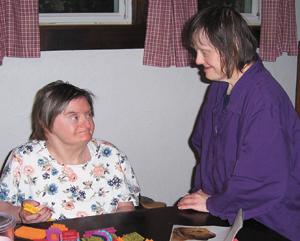
By Barb Arland-Fye
Dinnertime is approaching and four longtime housemates with intellectual disabilities are biding their time in various ways.
Sixty-one-year old Mary Pat Buckman is listening to her favorite Beatles songs on a CD player in the dining room, but the disc is scratched so the music jumps and fades. She taps several times on the CD player, which doesn’t stop the glitches, but she remains hopeful the effort will pay off.
Her best friend and roommate, 66-year-old Bertie Roberts, sits at the dining room table examining an orange, toy Bristle Block; an assortment of other Bristle Blocks are scattered on the table before her. Bob Wessels, 67, sits in the kitchen observing dinner preparations and lunches being made for the following work day. Fifty-nine-year-old Keith Behne who’s lived in the house the longest — 36 years — watches intently through a kitchen window for his ride. He won’t be eating at home tonight; he’s going on a “date,” he tells a visitor; and he’s anxious for her to arrive.
Welcome to Arch I, the first-established of three houses and five apartments where adults with and without intellectual disabilities share life in community as members of The Arch, L’Arche in Clinton. French-Canadian Jean Vanier founded the first L’Arche community in France in 1964 and inspired many to follow, including the Clinton community which opened in 1974 under the leadership of Clinton Franciscan Sister Marjorie Wisor. L’Arche takes its name from “The Ark,” a symbol of hope, refuge and diversity in Scripture. Individuals with intellectual disabilities are called core members; the individuals without intellectual disabilities who share life with them are called assistants. Nurturing a sense of belonging and fostering spirituality are essential elements of L’Arche.
Adapting to aging process
“Mary Pat Buckman and Bertie Roberts: Belonging to One Another” is the title of an article about the two best friends that Arch I House Coordinator Eric Plaut wrote for Hope Signs, a bi-annual newsletter of L’Arche USA. When Mary Pat moved into Arch I in 2000, “the two became roommates and almost literally inseparable,” Eric wrote. “Bertie was Mary Pat’s bridge to a new world.”
Bertie used to be like a big sister to Mary Pat, but the roles have gradually reversed. Mary Pat is “sometimes perplexed by Bertie’s emerging struggles with aging” but “nevertheless helps care for Bertie and loves her more openly than before.”
Both friends have outlived the average life expectancy for individuals with Down syndrome (60), and health issues impact all four housemates as well as some of the community’s other 18 members — 15 of whom are 50 years old or older.
While a bathroom has been modified, a bedroom moved to the first-floor and a wheelchair ramp installed at Arch I, acquisition or construction of a more accessible house has moved to the top of the community’s priority list.
“Core members are aging and there are health issues that necessitate the accomplishment of this goal in the near future,” Community Leader Keith Kalaukoa says.
That goal was front and center during a yearly retreat of The Arch community on a rainy September day inside Grace Lutheran camp near DeWitt. The Arch’s pastoral ministers, Deacon Jeff Schuetzle of Prince of Peace Parish in Clinton and Annette Lyons, a Prince of Peace staffer, led the group through a story about a make-believe family who discovered the value and power of imagination by first experiencing its loss.
It will take imagination as well as fundraising to see the accessible house come to fruition. “A handicapped accessible home is what we need to spend our energy on,” Keith said during the meeting at which he accepted a mandate to serve another four years as community leader. The membership agreed that should be a top priority.
Relationships are sacred
Addressing changing needs is part of the international organization’s mission statement, says JoAnne Horstmann, regional coordinator for L’Arche USA’s Central Region. L’Arche understands it might not be able to serve as a permanent home for core members, but remains committed to lifelong relationships. That’s why The Arch taps into whatever resources are available — such as home health care and housing modifications — to ensure that Bertie can remain part of the community, JoAnne explains.
“Bertie was kind of the heart of L’Arche, very welcoming and vibrant … the relationships that Bertie has established at The Arch over the last 16 years are central. They can’t be duplicated. You can’t find a replacement in another care facility for those relationships.”
Eric, who describes himself as the house’s memory keeper, is compiling a memory book for Bertie and has asked all who know her to share pictures and stories. “We would like to celebrate her life while she is here to celebrate with us,” he said.
“The relationships you develop with people with disabilities helps you get in touch with your own poverty and that’s where you meet Jesus,” explains JoAnne. “As long as we keep focusing on relationships and spirituality, those are two keys in L’Arche. They have to be what grounds us.”
Help L’Arche
Marcy Trimble, assistant to the community leader of The Arch, L’Arche, said in addition to raising funds for a house estimated to cost about $400,000, the community needs to encourage city homeowners’ receptivity.
Many residential areas have covenant agreements that restrict usage to single-family dwellings. Some people may not want individuals with disabilities living near them. It’s really about needing to educate others that people with intellectual disabilities are good neighbors, she noted.
She sees an encouraging sign in a $20,000 grant from the Clinton County Community Development Association to use toward purchase of property.
If you would like to help, contact archlarche.clinton@gmail.com or call (563) 243-9035.








